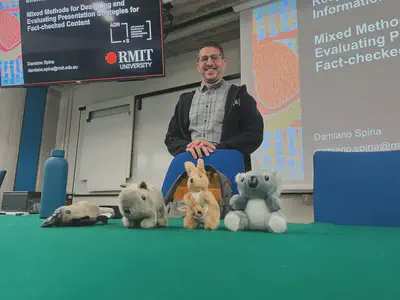Responsible AI from the Lens of an Information Retrieval Researcher
A Hands-On Tutorial at ACM SIGIR CHIIR'25
Abstract
While the concept of responsible AI is becoming more and more popular, practitioners and researchers may often struggle to characterize responsible practices in their own work. Using a hands-on approach – where participants are invited to discuss terminology from their own perspectives – this tutorial aims to illustrate the application of responsible practices in Information Retrieval (IR), including fairness-aware information access, diversity, and misinformation management. Using case studies based on existing IR research, the tutorial will explore responsible AI concepts such as positionality, participatory research, fairness, diversity, and ethics.
Presenter: Damiano Spina

Dr. Damiano Spina is a Senior Lecturer at the School of Computing Technologies, RMIT University, Australia, an Associate Investigator at the ARC Centre of Excellence for Automated Decision-Making and Society (ADM+S), and RMIT Research Lead at the Australian Internet Observatory (AIO).
His research focuses on interactive information retrieval and evaluation of information access systems. Dr. Spina completed his PhD in Computer Science in 2014 (UNED, Spain). He has published more than 70 peer-reviewed scientific publications in the field of information retrieval. He serves as editorial board member for IP&M and ACM TOIS, and he is an active Program Committee member of various IR conferences. He is the recipient of an ARC Discovery Early Career Researcher Award (DECRA) and the 2021 RMIT Award for Research Impact (Technology).
Dr. Spina is an active mentor and PhD supervisor, including co-supervision in multidisciplinary teams with media and communication, psychology, and design. He has co-organized workshops in international conferences and shared tasks for evaluation campaigns at CLEF and IberLEF.
Learning Outcomes
The tutorial is designed to practitioners and researchers interested in knowing more about how to apply responsible practices in their work. It is potentially relevant to all conference attendees, including students, early-career, and experienced researchers.
The learning outcomes of this half-day tutorial are two-fold:
- A better understanding of the concept of positionality, and the acknowledgment of differences in terminology and methods when working in multidisciplinary teams; and
- The application of responsible AI concepts in the context of interactive information retrieval research.
A longer version of this proposed tutorial has been delivered as a 10-hour course to more than 20 students enrolled in the AI PhD program at the University of Udine (Italy). Anonymous student feedback from a survey with 14 responses reflects high satisfaction (8.64/10 average rating) and positive comments, e.g.:
“I totally enjoyed the group activities. They were a good way to interact with other students coming from different fields/sub-fields, so the chats we had were sometimes strange yet overall engaging”.
Course Report:
Tentative Schedule
Friday, 28 March 2025 at the RMIT Storey Hall, Building 16 - ACM SIGIR CHIIR'25
| Time (PM) | Activity |
|---|---|
| 1:30–1:45 | Acknowledgment of Country & Opening |
| 1:45–3:00 | Part I: Positionality and group activity (keywords) |
| 3:00–3:30 | Afternoon tea break |
| 3:30–4:45 | Part II: Case Studies (participatory research and ethical considerations) |
| 4:45–5:00 | Wrap up & Closing |
Material
The slides used for the tutorial are available here.